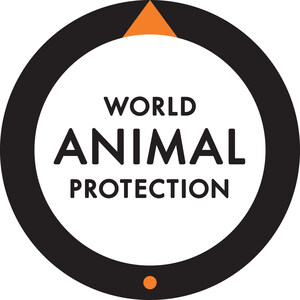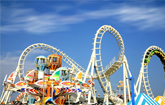NEW YORK, July 29, 2019 /PRNewswire/ -- SeaWorld San Antonio has come under fire from the global charity, World Animal Protection, and Change For Animals Foundation for its use of marine mammals in circus-style shows and swim-with experiences, including making dolphins 'breakdance' on land and forcing sea lions to hold 'lightsabers' and re-enact scenes from the movie Star Wars.
As part of a first of its kind study, 'The show can't go on', it shows that wild animals are being abused and forced to perform demeaning and unnatural tricks, ensuring appalling suffering at some of the world's 'top' zoos.
The research, which includes a global survey, investigates zoos and aquariums that are members of The World Association of Zoos and Aquariums (WAZA) – the global umbrella organization for zoos and related institutions, set up to guide, encourage and support venues in wild animal care and welfare. It reveals that of all WAZA's 1,200 linked venues, 75 percent offer at least one animal visitor interaction including some truly horrific cases that have no place in modern zoos and aquariums.
The research included field visits to a dozen zoos that showcase animals being cruelly used in demeaning experiences, focusing on big cats, dolphins, elephants and primates. Specifically, the study discovered big cats in gladiator-style shows in large amphitheaters1, dolphins being used like surfboards2, elephants playing basketball3 and clothed chimps in diapers, driving around on scooters4 — all activities that would require cruel training techniques of these wild animals.
Among the twelve zoos highlighted, SeaWorld, in San Antonio, Texas forces beluga whales to give rides to humans, 'wave' at audiences and act out scenes from famous motion pictures. Dolphins are made to 'walk' on their tails and perform choreographed routines set to music, and orcas are trained to 'play catch' and do flips.
Additionally, dolphins are trained to lunge out of the water to beach themselves as a background prop for photographs, exposing rake marks on their bodies. Trapped in tiny tanks, dolphins are unable to escape aggressive tankmates which can lead to major injuries and even death. Sliding out of the water and lifting their flukes puts an unnatural amount of pressure on dolphins' bodies and beaching themselves for an extended amount of time would slowly crush their internal organs.
Executive Director Alesia Soltanpanah at World Animal Protection says:
"It is troubling that in 2019 we still have venues such as SeaWorld San Antonio inflicting this level of suffering on wild animals and calling it entertainment. Seeing wild animals perform in shows as photo props is unnatural and leads to a lifetime of suffering. These demeaning attractions simply have no place in any modern leading zoo or aquarium whilst hiding under the label of 'conservation.' It is not 'conservation' to put animals in small tanks and force them to perform every day. That is called 'cruelty'."
Harry Eckman (Director, Change For Animals Foundation) said:
"All of these ridiculous activities represent a clear and present danger to the wild animals involved. Circus-like shows and elephant rides typically involve harsh training methods to establish dominance and the use of wild animals as photo props can inflict stress and injuries."
Audrey Mealia, Group Head of Wildlife, World Animal Protection said:
"Seeing wild animals being used purely as circus acts and photo props was more like a horror show. This research makes the case clear that WAZA needs to act urgently to stop cruel and demeaning attractions getting away with everyday cruelty – these ridiculous activities should be a thing of the past. Tourists visiting a WAZA-linked venue should be able to trust they are not inadvertently supporting cruel animal attractions. Sadly, currently this is not the case."
In the absence of a single global regulatory body for wildlife tourism, visitors may unknowingly be putting their trust in WAZA-linked venues. World Animal Protection and Change For Animals Foundation want holiday-makers and other visitors to reconsider visiting and sharing pictures at irresponsible zoos and aquariums such as SeaWorld San Antonio. These organizations are now moving people to take a stand, be part of the solution, and boycott venues that offer cruel interactions. This will send out a clear message – that treating animals this way is not acceptable.
For those who want to go the extra mile, the charities are also encouraging people to email WAZA asking them to ensure that they stand up for the animals suffering in member zoos and aquariums.
WAZA prides itself as an organization that sets the bar high for zoos aspiring to be modern and upholding high animal welfare standards. Their guidance states that members should not involve animals "in animal shows, displays or interactive experiences where animals perform demeaning and unnatural behaviours." Yet our research exposes how WAZA is not enforcing rules and zoos are falling seriously short of their commitments to animal welfare.
The best place to see wild animals is in the wild. However, if people want to visit a zoo, World Animal Protection recommends to not go to venues which allow:
- you to ride, touch and bathe a wild animal
- you to take photographs with wild animals being used as photo-props
- you to see wild animals perform in circus-like shows
- you to see animals in clothes or exhibits that are unnatural or human-like
- any opportunities for animals to have to interact with people or staff repeatedly for the duration of the day.
The twelve venues visited are:
- Dolphin Island (Resort World Sentosa) - Singapore
- Zoo D'Amneville - France
- Jungle Cat World - Canada
- African Lion Safari - Canada
- Cango Wildlife Ranch - South Africa
- Sea World - Australia
- SeaWorld - San Antonio, USA
- Zoo Marine - Portugal
- Puy du Fou - France
- Avilon Zoo - Philippines
- Mystic Monkeys & Feather Wildlife Park - South Africa
- Ichicara Elephant Kingdom – Japan
About World Animal Protection
From our offices in Australia, Brazil, Canada, China, Costa Rica, Denmark, India, Kenya, the Netherlands, New Zealand, Sweden, Thailand, UK and USA, we move the world to protect animals. During 2018 we gave more than three billion animals better lives through our campaigns that focus on animals in the wild; animals in disasters, animals in communities and animals in farming. Since the launch of our Wildlife not Entertainers campaign in 2015, more than 1.6 million people have joined our campaign to protect wild animals from abuse and cruelty in the name of entertainment.
About Change For Animals Foundation
Change For Animals Foundation works with local and international partner organizations throughout South East Asia to raise public and political awareness of the plight of the region's wildlife in captivity. In Indonesia, Change For Animals Foundation's project has exposed the exploitation and suffering of wildlife housed in zoos and safari parks throughout the country. In Vietnam it has worked to improve the welfare of wild animals housed in zoos and government-run rescue centers. It has also assisted with the provision of essential staff training to develop the necessary knowledge and skills to protect wildlife.
1 This can be seen at Puy du Fou - France
2 This can be seen at Zoo Marine - Portugal
3 This can be seen at Ichicara Elephant Kingdom - Japan
4 This can be seen at Avilon Zoo - Philippines
SOURCE World Animal Protection

Related Links
http://www.worldanimalprotection.us.org
WANT YOUR COMPANY'S NEWS FEATURED ON PRNEWSWIRE.COM?
Newsrooms &
Influencers
Digital Media
Outlets
Journalists
Opted In





Share this article